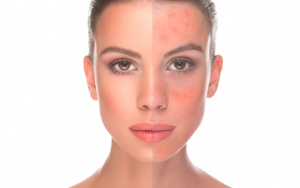Redness, thick skin, pimples, and bumps are things that just about everyone experienced growing up as a teenager. But if you find yourself well past your teenaged years and still struggling with symptoms like those just described, you may have a skin condition called rosacea.
Rosacea is a type of chronic skin condition which causes inflammation and redness in the facial region for those afflicted. It is primarily found in adults over the age of 30, and bares a strong resemblance to the acne and face blemishes experienced by those in their teenaged years. While not life threatening, 1 in 20 Americans are impacted by it, often resulting in discomfort and inconvenience for those impacted by it. While the exact causes of rosacea have still not been determined, it is often misdiagnosed as being either acne or eczema, and typically will not go away unless treated properly by a skincare expert.
It is interesting to note that most adults aren’t aware that their rosacea exists until almost 20 years old. In fact, according to the American Academy of Dermatology’s website, most adults don’t realize that this is a chronic problem until their mid-to-late 20’s. Most adults wait until almost 40 years of age before properly seeking out the needed medical attention. Interestingly, according to the same research, there are as many adults in the age range of 41-59 as in the 60 and over age range that are dealing with this issue every day.
Being able to talk with a dermatologist is important as any rosacea left untreated will worse with age and can cause permanent damage to the skin. Today, 14 million Americans are faced with this issue and it seems like the numbers will continue to trend upward. One might want to take note that the thickened, swollen skin could cause such bad inflammation that it could extend into your eyes as well as the skin above and below your eyes. One might want to consult their family heritage since Stanford University School of Medicine has recently identified a genetic basis for rosacea. Even though this is still in the early research stages, their partnership with the genetics company 23andMe, has started to better understand just how and why people are effected.
There are multiple forms of treatment for those with rosacea. To help with puffiness and swelling, topical creams and medicines can be applied to help reduce inflammation, as well as antibiotic prescriptions will assist in this area. For more severe inflammation and visible blood vessels, a laser treatment making use of intense pulsed light can be used to shrink the veins. This process is relatively painless, with few patients ever requiring anesthetic to assist their tolerance.
Nobody should ever be left with a facial complexion that is red, uncomfortable, and unpleasing to their own eye. So please, if you or a loved one has been experiencing issues with facial reddening, bumps, or enlarged veins, please schedule an appointment today, and we can get your skin back to its natural, healthy complexion!
The Dermatology Center of Indiana has offices in Plainfield and Zionsville, Indiana and services sounding cities including: Indianapolis, Carmel, Fishers, Westfield, Brazil, Bloomington, West Lafayatte, Terre Haute, Greencastle, Mooresville, and more.
Disclaim: This blog provides general information and discussion about medical, cosmetic, mohs, and surgical dermatology. The words and other content provided in this blog, and in any linked materials, are not intended and should not be construed as medical advice. If the reader or any other person has a medical concern, he or she should consult with an appropriately-licensed dermatologist or other health care worker.
